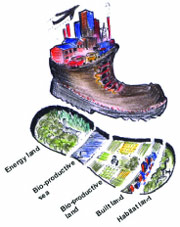 A highly communicative indicator, the Ecological Footprint provides a measure of how much productive land and water a city requires to produce all the resources it consumes and to absorb all the waste it generates, using prevailing technology.
A highly communicative indicator, the Ecological Footprint provides a measure of how much productive land and water a city requires to produce all the resources it consumes and to absorb all the waste it generates, using prevailing technology.Most cities live beyond their ecological means. The challenge is to understand the nature and extent of their ecological consumption and to undertake strategic actions that address their most damaging environmental impacts. Appropriate benchmarking tools and indicators help stakeholders measure progress.
The Ecological Footprint metric, pioneered by Rees and Wackernagel, is a comprehensive indicator as well as a framework for benchmarking urban systems.
When coupled with participatory processes, the Footprint can be used as a powerful tool to promote sustainable communities. World Urban Forum Actionable Ideas
Build your own ecological home another actionable idea.






3 comments:
This concept sounds interesting, can you tell us more about it citing examples of cities of the world.
I am going to have to quote the WUF site; I'm still wrapping my head around a whole load of new terminology emerging from WUF.
Cardiff Wales embarked on this program to measure the Ecological Footprint of the city. Since then a few cities in the UK - and Stolkholm have used the model in planning. Cape Town - oy vey - well they could do with a plan "."
"A footprint is expressed in global hectares (gha) per capita. The total bio-productive land and sea on the planet divided by the global population, yields an earth-share of only 1.9 gha/capita. An average US citizen has a footprint of 9.5 gha while an Indian citizen has a footprint of only 0.8 gha."
Very Cool links... I'm still reading, browsing and keeping the eyes open with matchsticks - trying to live Canadian time so that I can grab WUF3 information :)
Global Footprint Network: http://www.footprintnetwork.org/
Cardiff EF study: http://www.walesfootprint.org
London, UK footprint analysis: http://www.citylimitslondon.com/
Toronto, Ontario Ecological Footprint Questionnaire Pilot Study: http://www.toronto.ca/eia/footprint/index.htm
Stockholm Environment Institute: http://www.york.ac.uk/inst/sei/IS/sustain.htm
Post a Comment